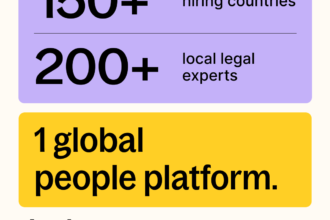Expanding into international markets presents a wealth of opportunities, but it also comes with challenges such as legal compliance, payroll management, and employee benefits administration. For businesses looking to scale globally without setting up foreign entities, an Employer of Record (EOR) offers a seamless solution.
In this blog, we will explore how EOR services facilitate international expansion and help businesses grow efficiently and compliantly.
1. Enables Quick Market Entry
Setting up a legal entity in a foreign country is time-consuming and expensive. It involves:
- Registering a local company.
- Obtaining necessary business licenses.
- Navigating complex labor laws.
An EOR allows businesses to hire employees in new markets within days, eliminating the need for a local entity and significantly reducing time to market.
2. Ensures Compliance with Local Labor Laws
Every country has unique employment laws, tax regulations, and worker protections. Non-compliance can lead to:
- Legal penalties and fines.
- Employee disputes and reputational damage.
An EOR acts as the legal employer, ensuring all labor laws, contracts, and tax regulations are met, mitigating compliance risks.
3. Simplifies Global Payroll & Taxation
Managing payroll across multiple countries is complex due to:
- Different tax rates and social security contributions.
- Varying payroll cycles and currency conversions.
- Mandatory employee benefits and deductions.
An EOR streamlines global payroll, ensuring employees are paid accurately and on time while handling tax withholdings and government filings.
4. Provides Competitive Employee Benefits
Attracting top talent requires offering competitive benefits, such as:
- Health insurance and pension contributions.
- Paid time off and parental leave.
- Bonuses and other statutory benefits.
An EOR offers localized benefits packages, helping businesses attract and retain top global talent.
5. Reduces Costs and Administrative Burdens
Setting up and maintaining a foreign entity involves ongoing costs, including:
- Legal and regulatory fees.
- Accounting and HR management expenses.
- Compliance monitoring and audits.
By using an EOR, companies save on operational costs and administrative efforts while focusing on core business activities.
6. Supports Workforce Flexibility
Businesses need workforce agility to scale operations efficiently. An EOR provides flexibility by:
- Facilitating remote work and distributed teams.
- Enabling companies to hire contractors or full-time employees as needed.
- Managing employee transitions, terminations, and rehiring.
Conclusion
An Employer of Record (EOR) is a game-changer for businesses looking to expand internationally. It enables quick market entry, ensures compliance, simplifies payroll, and reduces administrative burdens—all while providing the flexibility needed for global success.






